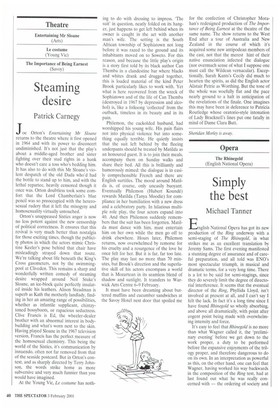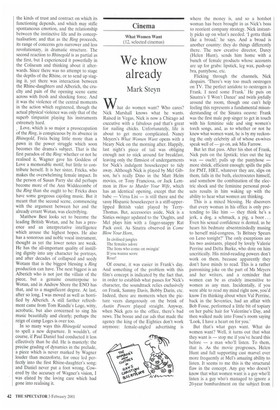Simply the best
Michael Tanner
English National Opera has got its new production of the Ring underway with a semi-staging of The Rhinegold, in what strikes me as an excellent translation by Jeremy Sams. The first evening manifested a stunning degree of assurance and of careful preparation, and all told was ENO's most spectacular triumph, in musical and dramatic terms, for a very long time. There is a lot to be said for semi-stagings, since they do severely limit the degree of directorial interference. It seems that the eventual director of the Ring, Phyllida Lloyd, isn't involved at present at all, and I can't say I felt the lack. In fact it's a long time since I have found Rhinegold so wholly absorbing, and above all dramatically, with point after cogent point being made with overwhelming intensity and force.
It's easy to feel that Rhinegold is no more than what Wagner called it, the 'preliminary evening' before we get down to the work proper, a duty to be performed before the expansive enjoyments of the trilogy proper, and therefore dangerous to do on its own. In an interpretation as powerful as this, on the other hand, one can feel that Wagner, having worked his way backwards in the composition of the Ring text, had at last found out what he was really concerned with — the ordering of society and the kinds of trust and contract on which its functioning depends, and which may stifle spontaneous emotion, and the relationship between the instinctive life and its conceptualisation; and that as the Ring proceeds, its range of concerns gets narrower and less revolutionary, in dramatic structure. The second reaction to Rhinegold is as partial as the first. but I experienced it powerfully in the Coliseum and thinking about it afterwards. Since there was no attempt to stage the depths of the Rhine, or to send up staging it, yet there was interaction between the Rhine-daughters and Alberich, the cruelty and pain of the opening scene came across with fresh and shocking force. And it was the violence of the central moments in the action which registered, though the actual physical violence was only that of the superb timpanist playing his instruments extremely hard.
, Love, which is so major a preoccupation of the Ring, is conspicuous by its absence in Rhinegold, Freia being little more than a pawn in the power struggle which soon becomes the drama's subject. That is the first paradox of the Ring: whether or not he realised it, Wagner gave his Goddess of Love a memorable motif, but little to contribute herself. It is her sister, Fricka, who makes the overwhelming female impact. In the person of Susan Parry she did perhaps become more of the Ann Widdecombe of the Ring than she ought to be: Fricka does have some gorgeous cajoling music. But it meant that the second scene, commencing with the argument between her and the already errant Wotan, was electrifying.
Matthew Best looks set to become the leading British Wotan, and he has a presence and an interpretative intelligence which arouse the highest hopes. He also has a sonorous and noble vocal instrument, thought as yet the lower notes are weak. He has the all-important quality of instilling dignity into any character he portrays, and after decades of collapsed and seedy Wotans that is the biggest blessing a Ring production can have. The next biggest is an Alberich who is not just the villain of the piece, but a genuine counterpoise to Wotan, and in Andrew Shore the ENO has that, and to a magnificent degree. At last, after so long, I was moved as well as horrified by Alberich. A still further refreshment came from Tom Randle's Loge, witty, acrobatic, but also concerned to sing his music beautifully and clearly; perhaps the reign of camp Loges is over too.
In so many ways this Rhinegold seemed to spell a new departure. It wouldn't, of course, if Paul Daniel had conducted it less effectively than he did. He is masterly: the precise grading of dynamics in the prelude. a piece which is never marked by Wagner louder than mezzoforte, for once led perfectly into the first Rhine-daughter's song; and Daniel never put a foot wrong. Cowered by the accuracy of Wagner's vision, I was elated by the loving care which had gone into realising it.



























































 Previous page
Previous page